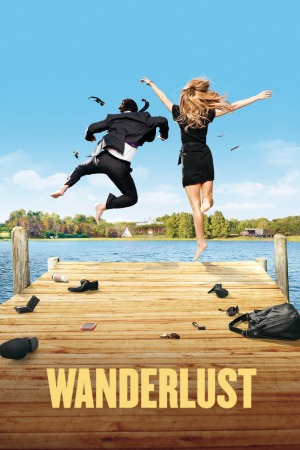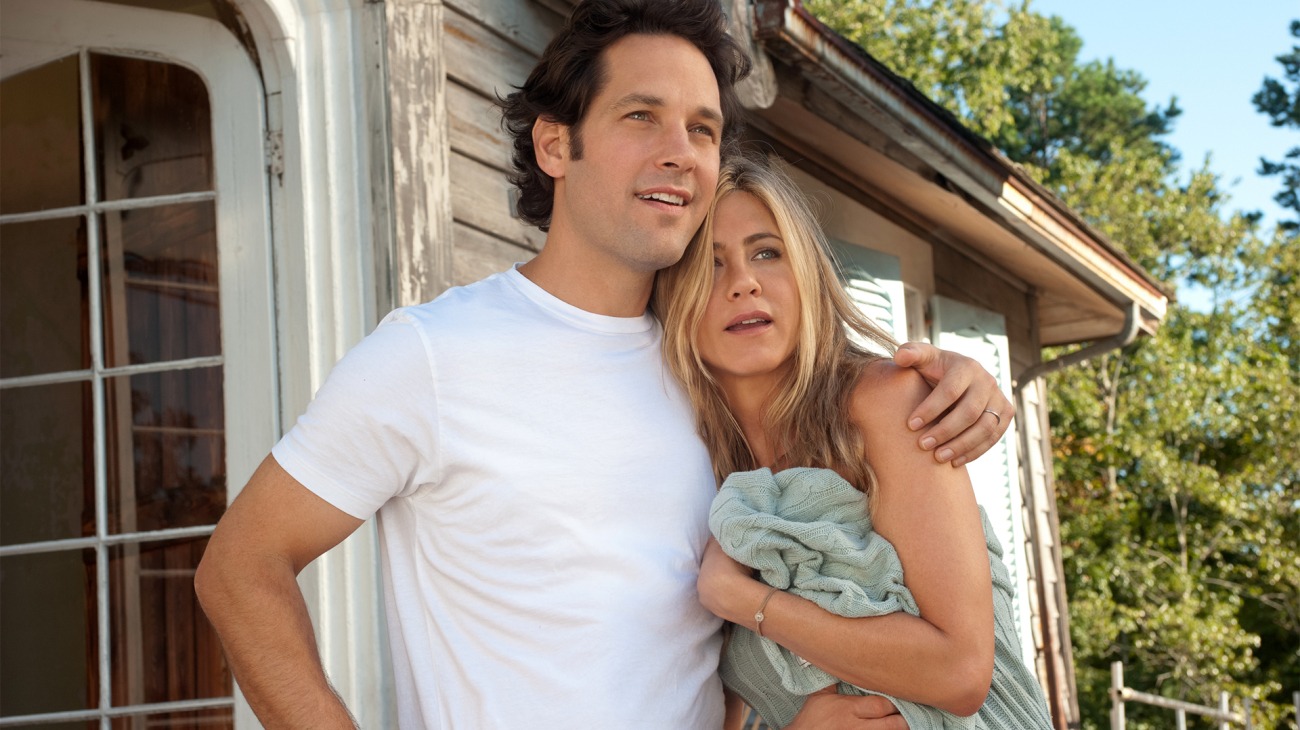
What's so funny 'bout peace, love, and understanding?
Many years ago, David Wain directed and co-wrote a film called Wet Hot American Summer, a terrifyingly good comedy that at once parodies and honors the tradition of early-'80s teen sex farces, which has amassed one of the most robust cults of any comedy made in the last decade and change. Since then, Wain's cinematic fortunes have been incredibly wobbly (his television work much less so), and that doesn't really change with Wanderlust his third feature since then, which reteams Wain for the fourth time with actor Paul Rudd and for the third time with co-writer Ken Marino, and thus has the inevitable feeling of a reunion of folks whose energy is directed much more towards hanging out on set than to creating blazing comedy. It's one of those things you can just tell, somehow; the film itself has a certain shaggy quality and a genial goofy feeling that is much too laid-back for its creation to have involved much emotional intensity. Two things are new: it's the first of Wain's pictures to be produced by comedy impresario Judd Apatow, whose influence is kept to an absolute minimum (only the producer's house specialty of jokes involving the appearance of flaccid penises onscreen specifically marks it out), and the first to feature Jennifer Aniston, whose presence is actually quite a major thing for the film, but I'll get there in a moment.
I brought up Wet Hot American Summer not merely as a yardstick for measuring how much less good everyone here is than they were there, but as a means of digging at why: for Wanderlust is itself a throwback to a different genre altogether. It is, weirdly, a situation comedy about the wacky ways of those commune-dwelling hippies, a genre that hasn't been groundbreaking since at least 1968, when Otto Preminger and Groucho Marx immolated themselves on the pyre of Skidoo (even more weirdly, it's the second consecutive Rudd vehicle for which is this true: he last appeared, on the other side of the culture divide, in Our Idiot Brother). Meaning that, unlike WHAS, it's not about to the pop culture of Wain et al's own adolescence, and this has a huge effect on how piercing and intelligent its deliberate anachronisms come across. It also leaves totally unanswered the question of why the hell this is happening: Rudd and Aniston, both born in 1969, play characters nowhere near old enough to have the kind of '70s nostalgia that the film is silently predicated on.
Anyway, if we concede to the film its peculiar mustiness, succeeding as neither genre pastiche nor self-conscious love letter, nor anything else than, as I said, a sitcom, we are left with a movie that is perfectly agreeable on its own terms, occasionally better and very infrequently worse. We're watching the home movies of Wain, Rudd, Marino, and several hangers-on goofing off with each other, and they're good enough at doing this that on balance, Wanderlust goes down pretty damn easy.
It's about a pair of married New Yorkers, George (Rudd) and Linda (Aniston), who both learn on the same day that they are without a job or income, right after they bought a tremendously expensive and minuscule West Village studio. Their first recourse is to head to Atlanta, and George's freakishly terrible brother Rick (Marino, doing what he does in his own scripts); when this proves too awful to stand, they retreat to a compound of placid, peaceable neo-hippies with whom they stayed for the night on their trip south, hippies played by the likes of Justin Theroux and Alan Alda and several faces familiar from previous Wain projects. At first, George is more excited about the laid-back world of the commune; then, when he concludes that it's all a bit too open and gauzy for his comfort, Linda turns out to be too comfortable there to leave. Originality is not on this story's side, nor does it appear to have been any kind of priority.
In practice, the movie plays largely as an excuse for Rudd to exercise himself - nearly all of the best moments foreground him, with the clear standout being a pep talk he gives to his reflection in an attempt to try out this "free love" thing, which consists largely of a series of improvised raunchy come-on lines delivered in stretched-out, cartoon voices - with Aniston on hand to give a narrative spine and provide him someone to react to. It's not as reductive as I've made it sound just there; in fact, Aniston gets quite a few opportunities to demonstrate an excellent skill with wry, semi-ironic humor, doing some of the best work she's ever done in a feature, and getting away with a surprising amount of her dignity intact for the female lead in a contemporary comedy. The two actors prove to fit into one another's simmering, off-kilter styles so well that it seems just plain wrong that they haven't worked together since 1998's The Object of My Affection, made all the way back before Paul Rudd even had a persona yet.
Other than Rudd being silly, or having playful old married couple chemistry with Aniston, there's not much too Wanderlust, which at least means there's not much to go wrong; the only exception is that, as with so very many comedies, when it starts to focus on its plot and character dynamics, the jokes dry up in a hurry, culminating in a well-intentioned but criminally unfunny coda that demonstrates, primarily, that Wain and Marino really love the heck out of their characters. And it is, by and large, an exceedingly generous movie, as sweet-natured as anything this dominated by jokes about sex and naked people could possibly manage to be; even the character who unsurprisingly emerges as the villain is treated with a rather gentle touch. There's no real mockery of the high-speed consumerist lives that George and Linda leave behind, nor of the airy counterculture of the commune; more of a freestanding sense of "gee, aren't people just kind of odd and charming, no matter what they do?" Which is a great attitude for creating an agreeable and non-confrontational movie, not so great for wringing great comedy out of the scenario (good comedy being, inherently, somewhat mean-spirited). It's a picture made with a lot of love, and not so much focus; much like Our Idiot Brother, it's too good-natured to dislike it, and in the same breath, too good-natured to have much depth.
6/10
I brought up Wet Hot American Summer not merely as a yardstick for measuring how much less good everyone here is than they were there, but as a means of digging at why: for Wanderlust is itself a throwback to a different genre altogether. It is, weirdly, a situation comedy about the wacky ways of those commune-dwelling hippies, a genre that hasn't been groundbreaking since at least 1968, when Otto Preminger and Groucho Marx immolated themselves on the pyre of Skidoo (even more weirdly, it's the second consecutive Rudd vehicle for which is this true: he last appeared, on the other side of the culture divide, in Our Idiot Brother). Meaning that, unlike WHAS, it's not about to the pop culture of Wain et al's own adolescence, and this has a huge effect on how piercing and intelligent its deliberate anachronisms come across. It also leaves totally unanswered the question of why the hell this is happening: Rudd and Aniston, both born in 1969, play characters nowhere near old enough to have the kind of '70s nostalgia that the film is silently predicated on.
Anyway, if we concede to the film its peculiar mustiness, succeeding as neither genre pastiche nor self-conscious love letter, nor anything else than, as I said, a sitcom, we are left with a movie that is perfectly agreeable on its own terms, occasionally better and very infrequently worse. We're watching the home movies of Wain, Rudd, Marino, and several hangers-on goofing off with each other, and they're good enough at doing this that on balance, Wanderlust goes down pretty damn easy.
It's about a pair of married New Yorkers, George (Rudd) and Linda (Aniston), who both learn on the same day that they are without a job or income, right after they bought a tremendously expensive and minuscule West Village studio. Their first recourse is to head to Atlanta, and George's freakishly terrible brother Rick (Marino, doing what he does in his own scripts); when this proves too awful to stand, they retreat to a compound of placid, peaceable neo-hippies with whom they stayed for the night on their trip south, hippies played by the likes of Justin Theroux and Alan Alda and several faces familiar from previous Wain projects. At first, George is more excited about the laid-back world of the commune; then, when he concludes that it's all a bit too open and gauzy for his comfort, Linda turns out to be too comfortable there to leave. Originality is not on this story's side, nor does it appear to have been any kind of priority.
In practice, the movie plays largely as an excuse for Rudd to exercise himself - nearly all of the best moments foreground him, with the clear standout being a pep talk he gives to his reflection in an attempt to try out this "free love" thing, which consists largely of a series of improvised raunchy come-on lines delivered in stretched-out, cartoon voices - with Aniston on hand to give a narrative spine and provide him someone to react to. It's not as reductive as I've made it sound just there; in fact, Aniston gets quite a few opportunities to demonstrate an excellent skill with wry, semi-ironic humor, doing some of the best work she's ever done in a feature, and getting away with a surprising amount of her dignity intact for the female lead in a contemporary comedy. The two actors prove to fit into one another's simmering, off-kilter styles so well that it seems just plain wrong that they haven't worked together since 1998's The Object of My Affection, made all the way back before Paul Rudd even had a persona yet.
Other than Rudd being silly, or having playful old married couple chemistry with Aniston, there's not much too Wanderlust, which at least means there's not much to go wrong; the only exception is that, as with so very many comedies, when it starts to focus on its plot and character dynamics, the jokes dry up in a hurry, culminating in a well-intentioned but criminally unfunny coda that demonstrates, primarily, that Wain and Marino really love the heck out of their characters. And it is, by and large, an exceedingly generous movie, as sweet-natured as anything this dominated by jokes about sex and naked people could possibly manage to be; even the character who unsurprisingly emerges as the villain is treated with a rather gentle touch. There's no real mockery of the high-speed consumerist lives that George and Linda leave behind, nor of the airy counterculture of the commune; more of a freestanding sense of "gee, aren't people just kind of odd and charming, no matter what they do?" Which is a great attitude for creating an agreeable and non-confrontational movie, not so great for wringing great comedy out of the scenario (good comedy being, inherently, somewhat mean-spirited). It's a picture made with a lot of love, and not so much focus; much like Our Idiot Brother, it's too good-natured to dislike it, and in the same breath, too good-natured to have much depth.
6/10
Categories: comedies, the apatow collective, travelogues






